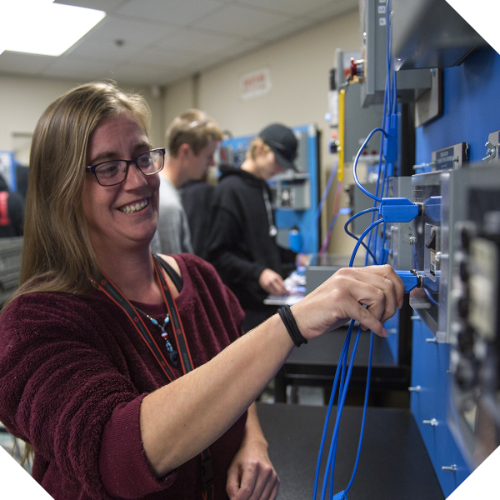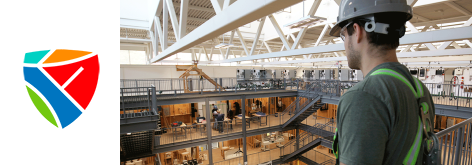Why College?
Unlocking Success: Why You Should Choose College for Your Trades Education
Top 5 Reasons to Start Your Skilled Trades Career at an Ontario College
1.
In-class training exemptions
Complete your college program and get exempted from in-class apprenticeship requirements.
Some trades-related college certificate and diploma programs provide graduates who become apprentices with the opportunity to receive automatic exemption from in-class training requirements, enabling them to continue working and learning their trade from an employer. For an employer, this means they don’t have to find a replacement for their apprentice while they complete their in-class training – a factor that may help the apprentice secure employment with that employer in the first place.
Additionally, many Ontario college programs that include apprenticeship training combine time in a real-world workplace with the required in-class learning (e.g., Level 1, Level 2, and Level 3). That means learners experience what it’s like to work in their chosen trade (in the workplace) while developing an understanding of crucial industry standards, practices, theories, and regulations (in the classroom).
The best part of completing a college program and an apprenticeship: at the end of it all, you’ll have a college credential (e.g., certificate or diploma) and a Certificate of Qualification in the trade you have chosen, potentially giving you a) a leg up in the labour market, and b) other post secondary pathways that college graduates are eligible to pursue.
To apply for this kind of an exemption, graduates simply need to take their college transcript and course outlines to their local Ministry of Colleges, Universities, Research Excellence and Security (MCURES) office.

Image Source: Fanshawe College
2.
Open doors with a college credential
Whether it’s a diploma, degree, or certificate, a college credential can open doors to future career opportunities.
To be clear, you don’t absolutely have to attend college to access a skilled trades profession. But as with any post-secondary credential in a field that interests you, it can open doors to future career possibilities.
Here’s an example: One person goes right into an apprenticeship, while a second starts with a college program in their preferred trade. While the first person can start their skilled trades career right away, the college graduate can still access an apprenticeship – and many other career options in their field – with a college credential in-hand.
Additionally, that college credential could enable the college graduate to ‘level up’ their career in the future by entering a management position in their field.
3.
Employer partnerships
Get access to co-op and even permanent employment opportunities.
To help students establish relationships with potential employers, many Ontario colleges have active partnerships with skilled trades employers in their communities.
These partnerships often provide students with co-op opportunities, but they can also result in graduates finding more permanent employment opportunities with organizations in their area.
For a more in-depth look at one of these partnerships, check out our blog about Mohawk College’s Future Ready Premium Employer Program.
4.
State-of-the-art facilities
Ontario colleges are modernizing skilled trades training through new, world-class trades facilities.
There’s a revolution going on at many of Ontario’s colleges. With the need for skilled tradespeople higher than ever, many colleges are building state-of-the-art trades facilities designed to provide hands-on instruction in a vast array of trades programs.
Take, for example, Conestoga College’s new Reuter Drive Campus in Cambridge. Opened in the fall of 2022, it features more than 150,000 square feet of shops and labs designed to help students find the trade that appeals to them and work towards credentials that can help them start a skilled trades career shortly after graduation.
But it’s not just Conestoga that’s overhauled their skilled trades facilities. Other colleges that have unveiled massive, new, and high-tech trades facilities include:
5.
Faculty with industry experience
You’ll learn the fundamentals of your trade from professionals who’ve worked in the field.
College faculty in the skilled trades are often experienced industry professionals – meaning they’re knowledgeable about their craft as well as teaching. That also means they can combine their experience with current workplace trends – like the new tools and approaches used on the jobsite – with emerging theories and ideas in the classroom.
In the end, that means students get a fuller picture of what they can expect to encounter when they graduate and enter the workforce. For an example of how industry professionals are training the next generation of skilled tradespeople at an Ontario college, check out this video of Mike Zarcharko of Georgian College.







